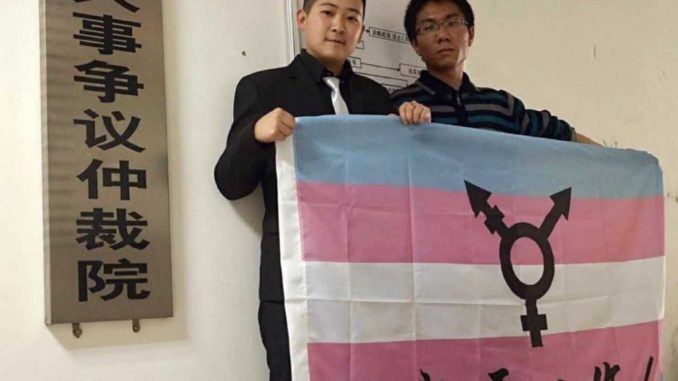
Transgender advocates celebrated the victory on China’s first ever transgender discrimination lawsuit, Vox reported last July 27.
A court in southwestern city of Guiyang ruled that the rights of Mr. C, a transgender man, were violated when he was fired by his employer in 2015 due to his gender identity.
Mr. C, 29, who chose to hide his true name to protect the privacy of his family and girlfriend, told AFP, “We hope, through this case, people in similar situations will realize they have a right, and we hope it will eventually result in a workplace anti-discrimination law.
Mr. C started working in sales at Ciming Health Exam Center, a company that provides health care services in Guizho province in April, 2015.
After his first week in probation, he was fired.
According to the company’s human resource, Mr. C told The New York Times, the reasons he was fired were because he dressed like a gay man and appeared unhealthy which was considered unbecoming of an employee of a health checkup company.
He took his complaint to the local labor arbitration committee in March 2015 for compensation of and a written apology. While he was paid 402.30 renminbi ($61 at that time) for the probation period, his request to be paid for the month’s wage of 2,000 and the apology were denied.
The case was brought to court and had its first hearing on June of last year.
In December 2016, the court decided to award 2,000 renminbi in compensation to Mr. C but also said that his termination was not from discriminatory attitude against transgender people like him. His demand for an apology was not granted.
“This has demonstrated how low the cost of breaking the law is for employers,” said Mr. C about the compensation. “This is why the current job discrimination situation is so grim.”
He also criticized how easy for employers to make up an alibi. “This case also highlights the problem of ‘invisible discrimination,’ because employers can always claim they fired people for reasons other than the one they’re accused of.”
The recent judicial decision declared that Mr. C’s rights were violated and directed Ciming to pay the equivalent of $297. It also stated employees must not be discriminated against based on ethnicity, race, gender or religious beliefs.
Stating that the decision has achieved its purpose, Mr. C said that it was short of an apology.
“Although the case has ended, we still have a long way to go,” he said in a statement reported by the Washington Post.
In China, there has been several high profile lawsuits but they have not resulted to legal victories for the LGBT community.
A court in Beijing ruled in September against a lesbian who sued the Ministry of Education on textbook passage that considered homosexuality as a disease. In April, a court in Hunan province denied a couple’s demand for marriage.
While homosexuality was decriminalized in 1997 and declassified as a mental disorder in 2001, the LGBT community is restricted by the state. Last month, the government banned any abnormal sexual behaviors online and in May, an LGBT conference in central China was canceled.
According to the study by the United Nations Development Program in 2016, 5 percent of the LGBT population in China is open about their identity at work or school and 17 percent are out to their families.
Changing perception towards the LGBT group has also been noted. A 2015 poll by Chinese advocacy group WorkforLGBT revealed that 77 percent of people said that workplaces must be welcoming to all, regardless of sexual orientation.
Five gender-neutral women, known collectively as Acrush, is one of the most popular boy bands in China. Their Weibo (China’s Twitter) fan page has over 700,000 followers.



1 Trackback / Pingback